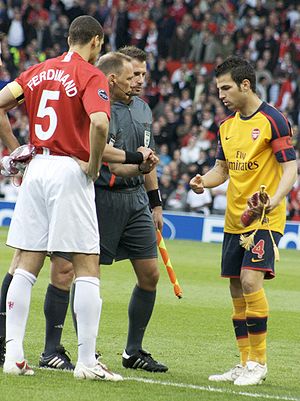 Image via Wikipedia
Image via WikipediaEnglish football doesn't mean Chelsea and Manchester United and Liverpool and Arsenal etc. and the Premier League. These clubs and the league they play in are obviously in rude health, living the life of luxury thanks to Sky's billions and a clutch of foreign investors.
English football means the English national side, English football players and, more than anything else, a way of playing.
The images conjured are of blood and thunder, hard tackling, fast, furious, whole hearted football.
It is an image which has come to be derided in many places and, as a nation, we are being encouraged to disown and be embarrassed by it.
The first was his continual, almost obsessive, use of Cesc Fabregas as his body of evidence for Spanish youth football being so much more advanced than ours.
Fabregas had been coached from the age of six at Barcelona before Arsenal basically stole him at the age of sixteen.
Nothing is proven by Cesc Fabregas, however.
He is an outstanding player, someone who genuinely lifts the standard of the Premier League.
But would he not have been an outstanding player even if he hadn't been at Barcelona at the age of six?
But surely Fabregas is a naturally gifted footballer. Brooking talks about first touch. Surely Fabregas wasn't taught how to trap a football. Surely Fabregas found trapping a football as easy to master as walking or talking, probably easier.
And Fabregas is the exception, not the rule. If every footballer coming out of the Barcelona academy was as good as him then we would have to admit that they were doing something remarkably right, and we were doing something wrong.
World class players, however, are generally born, not manufactured and you should be careful of jumping to conclusions based around the way these players emerge.
When Ajax of Amsterdam won the European Cup around a decade ago with a squad comprising of so many players that had come through their youth system everyone immediately decided that theirs' was the perfect system for developing young players.
Their methods were studied, documented and highlighted in the media endlessly and put before us as a foolproof method for rearing champions.
Of course Ajax have yet to challenge for another European Cup. Which is not to say their youth system is bad and lessons can't be learnt but is there any way of guaranteeing world class footballers? Or even Premier League class footballers?
Coaches make a difference to football, there can be no denying that. But is that difference for the better.
In the old days, which means the 1950's and earlier, coaching and tactics were kept to a bare minimum. Formations barely changed over half a century and teams just got on with the business of playing each other.
People laugh now at the scores that would regularly crop up each weekend as teams up and down the country tried to score more than the team they were playing against.
The only difference between football then and football now is that in those days teams went out to try and score against the opposition whereas now they go out and try to stop the other team from scoring against them.
It doesn't make them better footballers and it certainly doesn't make it any more entertaining for the spectators.
But coaches love to justify themselves therefore the old way had to be the wrong way. They don't seem to have worked out that in the end there can only ever be the same result. You either win, lose or draw and at the end of the season one team wins the league and one team finishes bottom. One team wins the cup and all the rest don't.
Once again the only difference is that nowadays the coaches and managers make sure that it is a lot less fun finding out who finishes where.
Another thing you will always hear coaches harping on about is how much faster the game is these days and how the great players of yesteryear wouldn't be able to cope in todays' game.
This really is the saddest is that coaches are intrinsically negative.

No comments:
Post a Comment